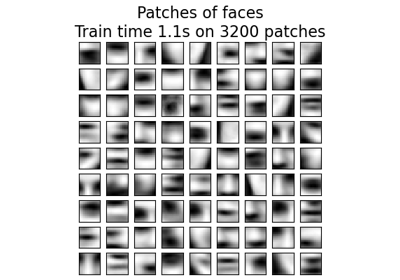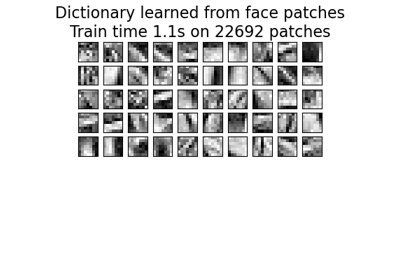sklearn.feature_extraction.image.extract_patches_2d¶
- sklearn.feature_extraction.image.extract_patches_2d(image, patch_size, *, max_patches=None, random_state=None)[source]¶
Reshape a 2D image into a collection of patches
The resulting patches are allocated in a dedicated array.
Read more in the User Guide.
- Parameters
- imagendarray of shape (image_height, image_width) or (image_height, image_width, n_channels)
The original image data. For color images, the last dimension specifies the channel: a RGB image would have
n_channels=3.- patch_sizetuple of int (patch_height, patch_width)
The dimensions of one patch.
- max_patchesint or float, default=None
The maximum number of patches to extract. If
max_patchesis a float between 0 and 1, it is taken to be a proportion of the total number of patches.- random_stateint, RandomState instance, default=None
Determines the random number generator used for random sampling when
max_patchesis not None. Use an int to make the randomness deterministic. See Glossary.
- Returns
- patchesarray of shape (n_patches, patch_height, patch_width) or (n_patches, patch_height, patch_width, n_channels)
The collection of patches extracted from the image, where
n_patchesis eithermax_patchesor the total number of patches that can be extracted.
Examples
>>> from sklearn.datasets import load_sample_image >>> from sklearn.feature_extraction import image >>> # Use the array data from the first image in this dataset: >>> one_image = load_sample_image("china.jpg") >>> print('Image shape: {}'.format(one_image.shape)) Image shape: (427, 640, 3) >>> patches = image.extract_patches_2d(one_image, (2, 2)) >>> print('Patches shape: {}'.format(patches.shape)) Patches shape: (272214, 2, 2, 3) >>> # Here are just two of these patches: >>> print(patches[1]) [[[174 201 231] [174 201 231]] [[173 200 230] [173 200 230]]] >>> print(patches[800]) [[[187 214 243] [188 215 244]] [[187 214 243] [188 215 244]]]


